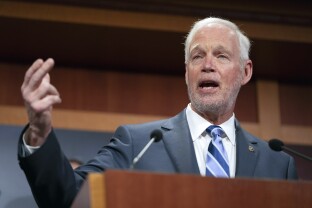Some conservative Republican senators are pushing for a new approach to Ukraine funding as the White House escalates its pleas for more financial support. Instead of a $60 billion supplemental the Biden administration has requested up front, a group of Republicans say they prefer a parceled-out approach tied to what happens at the southern U.S. border.
The discussions come as President Joe Biden personally appeals to lawmakers to pass a supplemental funding agreement to fund aid to Ukraine and Israel. Speaking to reporters after Wednesday’s White House meeting, Senate Majority Leader Chuck Schumer said there’s “broad consensus” on Ukraine across the parties in Congress and that for the first time, he put the chances at “a little bit greater than half” that a border supplemental deal would come together.
But they may run into trouble with Republican senators who want a more hardline approach on the border in exchange for aiding Ukraine.
Instead of putting $60 billion in place for Ukraine as Biden has requested, Sen. Ron Johnson (R-Wis.) has advocated making the funding contingent on “performance metrics” at the U.S.-Mexico border, which he proposed should not go above 1,000 crossings per day. Border officials encountered more than 10,000 people per day in December, according to Department of Homeland Security metrics.
Customs and Border Protection doesn’t make day-to-day metrics publicly available. But using a monthly estimate, the last time migrant encounters were below 1,000 per day was in April and May of 2020, according to Ariel Ruiz Soto, senior policy analyst at the Migration Policy Institute. That time was both the onset of the pandemic and the initial implementation of Title 42, which restricted crossings; Soto said it’s typical to see a pause in migration immediately after a new U.S. policy is enacted. Migration has consistently hovered around 1,000 crossings per day since 2013, Ruiz Soto said.
Johnson on Wednesday called for the conference to meet specifically on Ukraine next week, coming right when Schumer hopes to bring a deal to the floor. Sixteen Republican senators signed onto Johnson’s letter calling for the meeting.
Speaking with NOTUS, the senator proposed passing some Ukraine funding up front in a border and national security package, but making additional funding for Ukraine available on a month-to-month basis after a three-month period, contingent on whether U.S. border crossings are below that threshold.
“I am with the Ukrainian people, but the top priority, and I think Americans by and large agree with this too, is we’ve got to secure the border,” Johnson said.
Sen. Mike Lee (R-Utah) said he believed a “solid majority” of the conference prefers a metric-based approach, but that “we’ve been told that it’s not on the table or being negotiated.” In a conference lunch last week, Sen. James Lankford (R-Okla.), the leading Republican in bipartisan border reform negotiations, argued against the plan, saying it would divide the GOP, according to several senators.
“If you’re going to put Ukraine and the border in the same package, I think that tying it to border security metrics may well be the only way I can think of to make sure it happens,” Lee said. “It would make sense to make the Ukraine funding contingent upon the achievement of a certain level of border security that we can specify.”
In conversations with conservative senators over the proposal, most emphasized that before any agreement on how to fund Ukraine, they first need to see bill text for a border plan, where several issues, like parole, remain a sticking point between the parties. Sen. Lindsey Graham (R-S.C.) on Wednesday said that parole was a “red line” for the conference and that “without parole reform, there will be no supplemental.”
The most conservative Republican senators see the phased, 12-month metric approach as a way to put further pressure on the Biden administration to not only bargain on the border, but to uphold whatever agreement is made, Sen. Rick Scott (R-Fla.) said.
But even as some have joined in support of the plan, other conservatives, citing fiscal responsibility, still want to refrain from tying Ukraine and national security together into a border plan.
“The border is going to have to get done first,” Sen. Mike Braun (R-Ind.) said. “And I think if it gets done first for many, that would be enough to then turn their attention there.”
—
Katherine Swartz is a NOTUS reporter and an Allbritton Journalism Institute fellow.
Sign in
Log into your free account with your email. Don’t have one?
Check your email for a one-time code.
We sent a 4-digit code to . Enter the pin to confirm your account.
New code will be available in 1:00
Let’s try this again.
We encountered an error with the passcode sent to . Please reenter your email.


